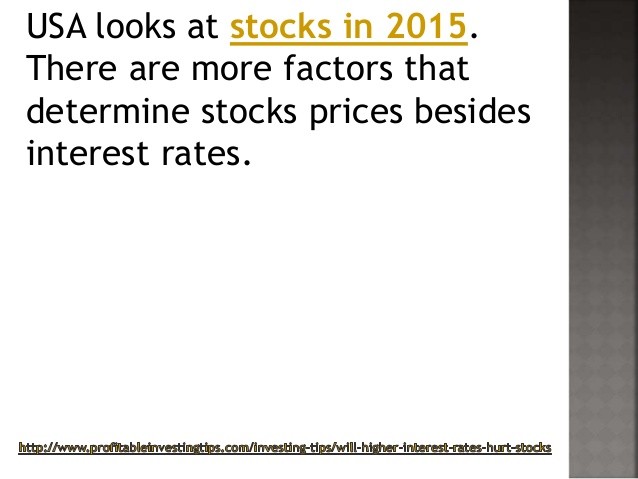Will Rising Interest Rates Hurt the Stock Market US News
Post on: 28 Май, 2015 No Comment

Higher rates don’t always hurt equities.
Spencer Rand
You can’t listen to the news these days without hearing about how interest rates are at historic lows. In 1981, the 10-year Treasury hit an all-time high of nearly 16 percent. Since then, interest rates have been steadily falling to their current value of around 2 percent. You may be familiar with the relationship between bond investments and interest rates (if not, here’s a one sentence answer: bond prices move in the opposite direction of interest rates), but how do interest rates affect the stock market .
This is a simple question that should have a simple answer, but as some of my lawyer friends would say … it depends.
If you sat down in an economics class today, you would probably learn that there is a negative relationship between interest rates and the stock market. In other words, when interest rates fall, the stock market rises and when interest rates rise, the stock market falls. There are two main reasons why this happens.
The first is that stocks appear more attractive when compared to bonds. For example, if you are a new investor, a bond that was paying 6 percent doesn’t look as great if interest rates fall and it now only pays 5 percent. Capital appreciation on stocks can be much higher than 5 percent, so investors feel that they can earn a higher rate of return in the stock market than in the bond market. The law of supply and demand then kicks in and pushes stock prices higher as more buyers enter the stock market.
iStockPhoto
The other reason the stock market typically rises when interest rates fall is due to the implications of lower rates for the broader economy. From an investor’s point of view an interest rate is the amount you earn, but from the borrower’s side, it’s just the opposite: the amount they have to pay. When companies and individuals can borrow more cheaply, they spend more. Consumers are more willing to buy big ticket items such as cars and homes, and businesses borrow money to finance their operations. All of this activity generates a positive outlook on the economy and, subsequently, stock market returns.

However, J.P. Morgan Asset Management looked at the relationship between the 10-year Treasury yield and the Standard & Poor’s 500 index over the past 50 years, and the results were not what I expected. Instead of seeing a negative relationship between the two, they actually found there was a fairly strong, positive relationship in certain situations.
When the 10-year Treasury yield was below 5 percent, rising interest rates were generally associated with rising stock prices. Why, you ask? If the economy has slowed down and the Federal Reserve is taking steps to try to revive it, they will lower interest rates for the reasons above. But once the Fed sees signs of a recovery, they will reverse their course and raise rates. which signals investors that the problems plaguing the economy are starting to ease. With interest rates as low as they are and the stock market as high as it is, it will be interesting to see if this relationship holds true moving forward.
Spencer D. Rand is an Asset Management Associate at Monument Wealth Management. a Registered Investment Advisor located just outside Washington, DC in Alexandria, Va. Spencer is not a registered investment advisor representative. Follow Spencer and the rest of Monument Wealth Management on their blog which can be found on their website, on Twitter @MonumentWealth, and on the Monument Wealth Management Facebook page.
The opinions voiced in this material are for general information only and are not intended to provide specific advice or recommendation for individual. To determine which investment is appropriate please consult your financial advisor prior to investing. All performance referenced is historical and is not guarantee of future results. All indices are unmanaged and may not be invested into directly.














